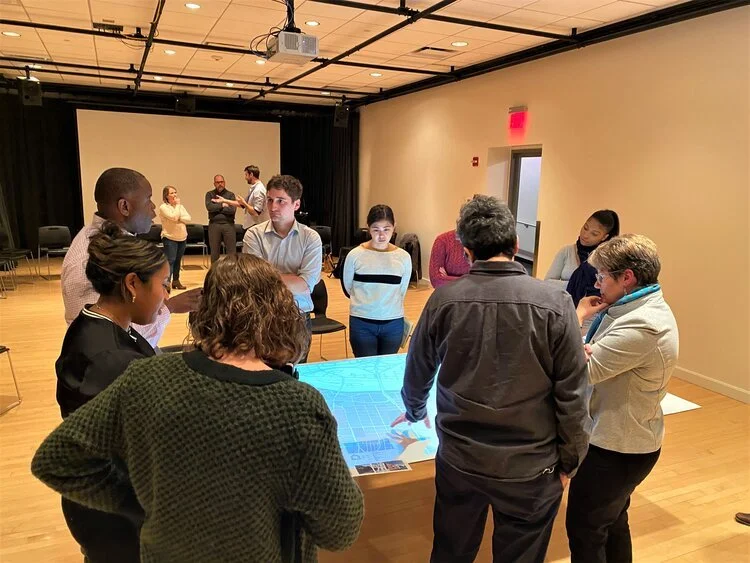Urban Design Studio - Partnership between RPI School of Architecture, TAP Inc and Habitat
Mapping open discussion
Photo credit: Daniel Morrissey/TAP, Inc.
TROY, NY — A new partnership has been formed between Rensselaer Polytechnic Institute’s School of Architecture (SoA), Troy Architecture Practice (TAP, Inc.), Habitat for Humanity Capital District, Troy Community Land Bank, and Architecture+. The project is called Urban Studio, which is comprised of two new Rensselaer Architecture studio courses, incorporating approaches to both new construction and renovation of existing buildings.
The former approach is being led by Professor Christopher Parkinson, RA, where students explore prototypical Habitat for Humanity homes locally, build full-scale mockup models of important detail moments out of real building materials, catalogue Troy’s urban fabric, and eventually propose innovations to the model. Professor Parkinson said, "In the Troy Housing Lab we are conducting some organized thinking about the concept of urban housing that we hope will come to some practical end through our partnership with Habitat for Humanity. Understanding the pressing need for affordability and sustainability, both by the Habitat organization and urban communities as a whole, we are exploring how increased housing density may meet these goals."
Habitat for Humanity Capital District is the direct community partner for Troy Housing Lab, and Executive Director Christine Schudde discussed her organization’s stake in this studio. She said, “There is a housing crisis in our community and we need creative, new solutions to solve it. Locally, one in three of our neighbors struggles to afford their housing and we know that the problem is only getting worse as wages stagnate, rents rise and the cost of construction increases. Habitat for Humanity is honored to work alongside the best and the brightest from our community and RPI’s SoA to innovate and test new solutions to address today’s urgent housing challenges. Together we can create a new model for Troy and other communities by designing homes that are affordable to build, easy to maintain and sustainable for families, neighborhoods and our planet.”
The latter approach, adaptive reuse of existing buildings, signifies a departure for RPI SoA and doubles down on the Institute’s commitment to sustainability. Focusing on upcycling vacant or abandoned properties, the LifeCycle Studio is being led by the director of RPI SoA’s Building Sciences program, Professor Mae-ling Lokko, PhD, as well as Professor Gustavo Crembil. The studio ethos is derived from the axiom that the most sustainable building is the one already built. As Professor Lokko explains: "The Life Cycle Studio is an opportunity for Building Science students to engage in a holistic form of design not limited to the technological performance of buildings but in response to a vast field of criteria that constrain every real life project. This ranges from environmental and social to economic and ultimately activates expanded propositions of survey, repair and maintenance practices. Alongside this, we also see it as a chance for our students to actively learn from the wealth of actors in Troy's building sector."
Sophie Morley keynote Q&A
Photo credit: Daniel Morrissey/TAP, Inc.
TAP has been sharing expertise and resources with LifeCycle Studio since its inception, and offers a wealth of knowledge on adaptive reuse precedents and municipal nuances in the Capital Region and beyond. Executive Director Barb Nelson, AIA, is an advocate of design and civic innovation and has enthusiastically helped launch this partnership. She said, “Together we will program, design, detail, estimate and construct innovative, sustainable and affordable urban housing models for real community clients. Construction sites are secured and provided by the Troy Community Land Bank’s portfolio of vacant properties within their target area of North Central Troy. Generally, these have been buildings that blend with their context and draw little attention to themselves. This new generation of homes will boldly express their contemporary ideals of self-sufficiency and environmental benefit.”
This project was initiated by Brian Barker, AIA, who is a principal at Architecture+, and serves as the president of the board for Habitat for Humanity Capital District, as well as secretary on Troy Community Land Bank’s board of directors. From his perspective, “This unique partnership seeks to harness the strengths and mission of four stakeholder institutions within the City of Troy to form an innovative design research and community development partnership for the Troy community. There are several notable precedents for the success of such programs including Auburn University’s Rural Studio, Yale University’s Jim Vlock Building Project, Virginia Tech’s design/build LAB, as well as others across the United States and Europe. I am thrilled at the prospect of working together with the wonderfully talented and devoted team from RPI’s SoA, TAP, Habitat for Humanity, and the Troy Community Land Bank for the revitalization of the North Central Troy neighborhoods. As an architect and local resident of the neighborhood, it’s a dream come true.”
On Monday, February 3, 2020, the School of Architecture at Rensselaer hosted the first of four planned forums this semester, which allowed students to present their initial findings on precedent projects in the same vein as their studio sequence and learn best practices from the project partners. The event took place in Studio Beta at RPI’s state of the art Experimental Media and Performing Arts Center (EMPAC), and included presentations from all three RPI SoA studio professors, as well as executive directors of TAP and Habitat, Barbara Nelson, AIA, and Christine Schudde, respectively, and project founder Brian Barker, AIA. A keynote presentation featured an international expert in the field of inclusive design, Sophie Morley, an architect from London who works with Architects Sans Frontiers (Architects Without Borders) and has taught in numerous UK universities, who now works as a program coordinator with the Neighborhood Design Center in Maryland. Her discussion focused on implementing participatory design to make the built environment more equitable as well as processes for leveraging building projects as a vehicle to dismantle structural oppressions. These strategies can help cities implement community wealth building programs to stem gentrification through progressive organizational models such as community land trusts and housing cooperatives.
CONTACT: Barb Nelson, RA, AIA (TAP, Inc.)
Mae-Ling Lokko, PhD (RPI SoA)
WEB: www.tapinc.org / www.arch.rpi.edu
EMAIL: bnelson@tapinc.org / lokkom2@rpi.edu
PHONE: (518) 274-3050 / (518) 276-6457


